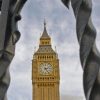On 20 March 2020, as the coronavirus pandemic was rampaging through New York, Andrew Cuomo announced new restrictions on home visits for older and vulnerable people. Unveiling the rules, named Matilda’s Law after his mother, at his televised daily briefing, the governor spoke passionately about the need for New Yorkers to care for one another.
“Those three-word sentences can make all the difference,” he said. “ ‘I miss you’, ‘I love you’, ‘I’m thinking of you’, ‘I wish I were there with you’, ‘I’m sorry you’re going through this’.”
Cuomo at bay as Covid nursing home scandal taints reputation
Read more
It was, he later recalled, “a very emotional moment for me, and it was reported that I shed a tear. I do know that I welled up with emotion that day.”
Cuomo’s Matilda’s Law moment – tears and all – was made for TV. Such displays of unrestrained emoting rapidly turned him into an American icon, the Italian American tough guy in touch with his tender side fighting for people in the heart of a dreadful pandemic.
His daily briefings became obligatory viewing, pushing Cuomo to the center of the national stage as the empathetic antithesis to Donald Trump. The New York Times declared him “politician of the moment”, CNN fantasised about a “President Andrew Cuomo”, and even the far-right Fox News guru Sean Hannity heaped praise on him on his radio talk show.
To cap it all, Cuomo, 63, got a book deal out of it. With characteristic hubris, he titled the work: Leadership Lessons from the Covid-19 Pandemic.
What a difference a few months make.
Fast forward to today, and Cuomo is now facing calls for his resignation, an investigation by the FBI and federal prosecutors, and angry state legislators from his own Democratic party who want to strip him of the emergency powers they granted him during the pandemic.
As for emoting, there is still plenty of that. But it’s not of the “Matilda, I miss you” variety. One of the New York Democrats who signed a letter calling for the withdrawal of Cuomo’s emergency powers told the New York Post that last week he received an unexpected phone call from the governor.
According to Ron Kim, an assemblyman from Queens, New York City, the call began with silence before Cuomo said: “Mr Kim, are you an honorable man?” He then proceeded to yell down the phone at Kim for 10 minutes, shouting: “You will be destroyed” and “You will be finished”.
When the Post’s report came out, Cuomo responded by devoting a large chunk of his press briefing to an all-barrels attack on Kim, accusing him of a slew of unethical practices.
The contrast between the untethered attack-machine of this week’s Cuomo, and the teary-eyed empathist he projected last March is so startling it has left many outside observers bemused. But to New York politicians who have for years been in the Cuomo orbit, it was as surprising as the spaghetti and meatballs the governor likes to cook his family every Sunday dinner.
“Meet the Governor Cuomo we’ve known all along, beneath the Emmy-winning performance he put on for months,” was how Jumaane Williams, the New York City public advocate, put it on Twitter this week.
The pandemic has exposed many things, and this is one of them
Jumaane Williams
The Guardian asked Williams, who acts as official watchdog for New Yorkers, to elucidate. “The pandemic has exposed many things, and this is one of them,” he said. “It’s been like a secret that up to now Cuomo’s got away with – his lack of accountability, the way he responds to political winds only when forced to.”
Ironically, the area that has landed Cuomo in such hot water is precisely the same as the one that inspired his tear-laden announcement named after his mother – caring for older and vulnerable New Yorkers through the pandemic. Three days after he executed Matilda’s Law, he created a new provision shielding hospital and nursing home executives from potential liability for decisions that might lead to people’s deaths from Covid.
As the journalist David Sirota has noted in the Guardian, Cuomo had received more than $2m from the Greater New York Hospital Association and its associated executives and lobbying firms – the very healthcare industry group that claims to have “drafted” the immunity clause.
The immunity provision has had a detrimental impact on the ongoing investigation into Covid deaths in New York nursing homes which accounted for almost a third of the total death toll of about 46,000. In a withering report released by the state’s attorney general, Letitia James, last month, she says that it has led to confusion about whether homes that failed to meet health standards for containing the pandemic could ever be held accountable.
James has demanded that the new immunity rules be scrapped.
That wasn’t the end of it. Two days after creating the immunity provision – five days after announcing Matilda’s Law – Cuomo released an advisory notice. It directed nursing homes to accept patients back from hospital who were infected or might be infected with coronavirus.
The homes had to admit anyone who was “medically stable” – no resident was to be denied readmission “solely based on a confirmed or suspected diagnosis of Covid-19”.
The motivation behind the notice was clear – there was an “urgent need” to expand hospital capacity in order to meet the surge in Covid cases. In other words, free up hospital beds by getting older patients back to their nursing homes.
The rest is history. A report by the New York department of health found that between the issuing of the advisory on 25 March and 8 May more than 6,000 Covid-positive residents were allowed back into nursing homes and long-term care facilities.
There has been a great deal of debate about the extent to which the governor’s March advisory was to blame for large numbers of nursing home deaths from Covid. When the Poynter Institute’s fact-checking arm, Politifact, reviewed the question it concluded that Cuomo had not forced nursing homes to take in sick patients as his Republican detractors had claimed.
But Politifact did conclude that the notice give care managers the distinct impression that they had no other option than to take the residents back in.
As with so many other political scandals before it, the real trouble with “Cuomo-gate” was not the arguable errors that were made but the lack of transparency about what happened next. That’s what really bugs the public advocate.
“My problem with Cuomo’s leadership is not that mistakes were made – mistakes are always made. But if you can’t take accountability for them and debrief what went wrong, then mistakes get made over and over again and people are dying for it,” Williams said.
The unravelling began with the attorney general’s report last month which revealed that deaths of New York nursing home residents were substantially higher than had been recorded by the Cuomo administration. Residents who had fallen sick and died after they were transferred to hospital were mysteriously left off the official count.
Then the New York Post dropped a bombshell. The paper reported that Cuomo’s top aide, Melissa DeRosa, had admitted to Democratic leaders in a conference call that the administration had withheld the true nursing home death toll from state lawmakers.
DeRosa told them in the leaked conversation that “we froze” because Donald Trump was trying to use the deaths as a “giant political football”.
What began as a dispute over health guidelines and immunity quickly morphed into a fully-fledged cover-up scandal. In the wake of the Post story, the state revised its official tally from 8,500 to more than 15,000 deaths – making a mockery of Cuomo’s long-standing boast that his state had among the best records in the country with regard to nursing homes Covid fatalities.
On Monday Cuomo was forced to issue an apology, of sorts. “We made a mistake,” he said, before swiftly going on to clarify that the mistake was to create a “void” that had “allowed misinformation and conspiracy” to flourish.
But he continued stubbornly to deny that death numbers had been massaged and insisted that everything had been done that could have been done to save lives.
The semi-apology has left many dissatisfied. “It sounds to me like the ‘I’m sorry I got caught’ kind of apology,” Williams said.
On Friday Alexandria Ocasio-Cortez, the Democrat who represents parts of the Bronx and Queens in Congress, added her powerful voice to calls for a full investigation into Cuomo’s handling of the nursing homes crisis. “Thousands of vulnerable New Yorkers lost their lives in nursing homes throughout the pandemic,” she said in a statement. “Their loved ones and the public deserve answers and transparency from their elected leadership.”
The public advocate wants an even more thorough accounting – a full investigation into every aspect of Cuomo’s response to the health crisis. There are leadership lessons to be learnt here, he thinks – rather less rosy ones than those the governor implied in the title of his book.
Williams points to the stuttering start of the pandemic when the state took several days to close schools and ban gatherings; the classification of “essential workers” who were obliged to keep on working and who were overwhelmingly drawn from black and Latino communities; and evidence of glaring racial disparities now just surfacing in the distribution of the vaccine.
“From infection to injection, the governor’s decisions have been wrong at almost every step,” Williams said. “He writes a book on leadership during the pandemic while at the same time hiding data, and people are dying. The arrogance is incredible.”























































Свежие комментарии